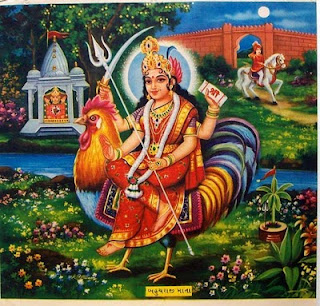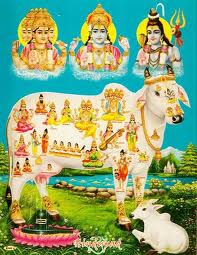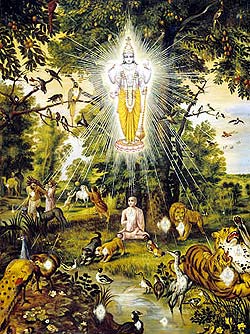namaskaram Ronki ji
I was under the assumption that Hindus do not eat beef because
a) Cows ploughed fields
b) Cows provided milk that all animals can drink
c) Krishna was Govinda
d) Cow gestation periods are 9 months, like humans
please excuse me for seeming pedantic , ...but Krsna IS Govinda , ......
''Never was there a time when
I did not exist , nor you , nor all these kings ; nor in the future shall any of us cease to be .'' BG v ..2 ch ..12
1, .....how could we displease him by killing Gomata ?
2, ....all gods reside in Gomata so she is considered the most worshipfull Deity
3, .... Sanatana Dharma is supported by four pillars these are likened to the legs of the Dharma Bull
in Srimad Bhagavatam (Arjuna's grandson) Maharaja Pariksit said , .......
'' In the age of Satya your four legs were established by the four principles of austerity, cleanliness, mercy and truthfulness. But it appears that three of your legs are broken due to rampant irreligion in the form of pride, lust for women, and intoxication. You are now standing on one leg only, which is your truthfulness, and you are somehow or other hobbling along. But ... [Kali], flourishing by deceit, is also trying to destroy that leg.''
''Mahārāja Parīkṣit, thus being petitioned by the personality of Kali, gave him permission to reside in places where gambling, drinking, prostitution and animal slaughter were performed. The personality of Kali asked for something more, and because of his begging, the King gave him permission to live where there is gold because wherever there is gold there is also falsity, intoxication, lust, envy and enmity. Thus the personality of Kali, by the directions of Mahārāja Parīkṣit, the son of Uttarā, was allowed to live in those five places. Therefore, whoever desires progressive well-being, especially kings, religionists, public leaders, brāhmaṇas and sannyāsīs, should never come in contact with the four above-mentioned irreligious principles. Thereafter the King reestablished the lost legs of the personality of religion [the bull], and by encouraging activities he sufficiently improved the condition of the earth.''
please note here it is plainly said , ....
''
Therefore, whoever desires progressive well-being, especially kings, religionists, public leaders, brāhmaṇas and sannyāsīs, should never come in contact with the four above-mentioned irreligious principles. ...........gambling, drinking, prostitution and animal slaughter .
But I was under the assumption we do not eat: snake because of Shiva, elephant because of Ganesha, monkey because of Hanuman,lion/tiger because of Durga, and crocodile because of Makara.
But chicken is eaten by everyone in India, Hindus too
to my mind we do not eat any animal for simple reason all animals paramatma residing within ,
4, ....lord resides in the heart of all animals , ..
"I am seated in everyone's heart , and from Me come remembrance , knowledge and forgetfulness . By all the Vedas , I am to be known . Indeed I am the compiler of Vedanta , and I am the knower of the Vedas ."
BG v ..15 ch ..15
And in Nepal they eat Buffalo/ in the seven sisters they sacrifice goats even though I read vedic scriptures prohibit animal sacrifice. You say it's 'easier' to sacrifice rice and grains and less costly but nowadays everyone can afford these things (in the Western world and by over 100 million Indians)
this is the efects of Kali yuga , .....all that remains is satyam , truth , ......but only a small percentage even of Hindus now recognise this truth , ....refering back to the words of Maharaja Pariksit , ......
''......Therefore, whoever desires progressive well-being, especially kings, religionists, public leaders, brāhmaṇas and sannyāsīs, should never come in contact with the four above-mentioned irreligious principles. Thereafter the King reestablished the lost legs of the personality of religion [the bull], and by encouraging activities he sufficiently improved the condition of the earth.''
therefore those who wish to call them selves Sanatana Dharmi or Vaisnava , ...should become aware of the true principles of Sanatana Dharma which means keeping all principles of ...and in their hearts the dharma bull still stands on four legs ,
austerity, cleanliness, mercy and truthfulness....These devotees do not live in Kali yuga .
therefore to me it is not about the financial cost of sacrifices or any such thing it is that
austerity , means forgoing attatchment to taste , even to tradition , it means non attatchment to sence gratification , ...and non attatchment to ritual sacrifice , ...
cleanliness , in this instance means not embibing unclean substances like the flesh of a dead animal , ....
mercy , means having respect for all life , treating all animal life as sacred , ....
truthfulness , in this instance means being true to the principles , recognising and respecting the words of Sri Bhagavan , ...''I am seated in everyone's heart'' .....this means not just in the heart of the Cow , but in the heart of the Chicken , the Goat the Snake or the Fish , ....
so to me if one thinks to Identify with Sanatana Dharma one must follow all these principles not just select what suits ones Cultural lifestyle , ....




